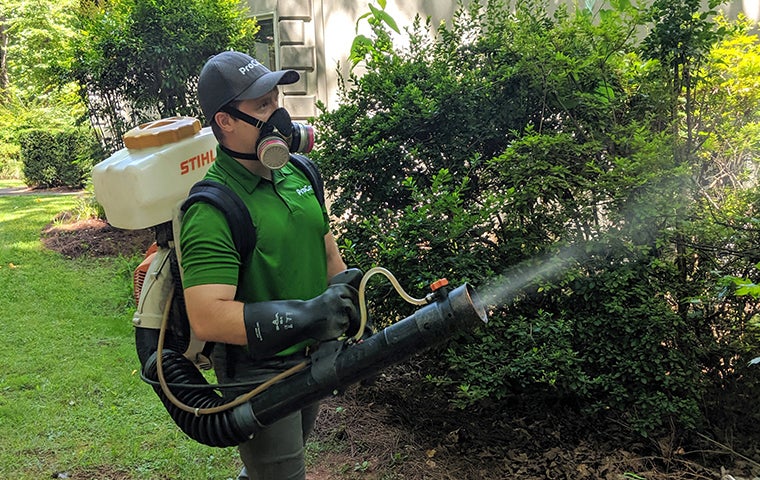The Bird Exclusion & Control In Medford Diaries
Table of Contents7 Easy Facts About Rodent Control & Prevention In Medford DescribedThe Facts About Cockroach Control And Prevention In Medford UncoveredSome Known Facts About Bed Bug Treatment In Medford.The Bed Bug K9 Inspections In Medford IdeasGetting The Bird Exclusion & Control In Medford To WorkBed Bug K9 Inspections In Medford - The Facts
Lots of safe, useful, nonchemical approaches of plant defense and insect management may decrease or get rid of the requirement to spray. Other approaches are most helpful when used with pesticides. To carry out management practices properly and to minimize losses, garden enthusiasts ought to understand the types of bugs that assault plants and understand pest biology.Bug management approaches fall into 4 groups: cultural, mechanical, biological, and chemical. Keeping plants healthy and avoiding plant stress helps plants to better stand up to and repair the damage triggered by an insect or mite bug. Some evidence indicates that healthy plants withstand invasion by pests better than plants with low vitality.
Lots of severe illness or insect issues can be halted or slowed by regularly going to the garden, knowing what to try to find, acknowledging possible issues, and stepping in early. Cultural methods of reducing insect and mite problems in the landscape consist of preparing the soil; choosing plants that are adjusted to the website conditions, that are not appealing to pests, which are tolerant of bugs and illness; rotating crops; interplanting; timing planting dates to prevent bugs; handling weeds; and planting "trap" crops.
Some Ideas on Rodent Control & Prevention In Medford You Need To Know
If tilling is deemed necessary, consider doing it in the fall when the life cycles of many bugs brings them near the surface area. At the surface, insects end up being exposed to the weather as well as birds and other natural opponents.
Take a look at plants carefully (tops of leaves, bottoms of leaves, stems, and soil) prior to planting to be sure they are clean. Think about planting determined as resistant to pests. Resistant cultivars are those that ward off, are unattractive to, or otherwise disagree as food for certain bugs or that withstand feeding by specific insects with little reduction in yield or quality.
If deer are a problem in a garden, select a plant that is naturally resistant to deer predation over a plant that is more attractive to deer. Planting two similar crops in successive years tends to increase bug problems.
Some Known Questions About Commercial Disinfecting In Medford.
Some bugs hibernate in the soil or litter around plants or lay eggs in or on the host plant. Do not grow the very same sort of vegetable in the same place each year (Figure 84). Usage associated crops in a site only as soon as every 3 or four years. The rotation duration for avoiding some tomato diseases might be five to 7 years.
Crop rotation is most efficient on insects that establish on a few plants (pest control solutions in Medford). Prevent putting all plants of one kind together; rather spread them throughout the garden (Figure 85). Consider rotating groups of different plants within rows or patches. Insects that become extreme on cabbage probably also infest close-by mustard, broccoli, and collards, but they might not spread to cabbage planted on the informative post other side of the garden.

Some Of Spider Treatments & Web Removal In Medford

The flowers of thistle, plantain, knotweed, and dandelion are essential to honey bee populations. Removing weeds after flowering but before seed set provides food for the honey bees but keeps the weeds from continuing to spread out. Another way to manage insect pests is to plant a crop that is extremely appealing to pests and after that deal with the trap crop with insecticide.

Almost any big non-venomous insect can be chosen off at any stage. To avoid the job have a peek at this website of hand-squashing the bugs, knock the bugs and egg clusters into a coffee can or quart jar with a view percentage of water and a little dish cleaning agent. Insect traps can help with detection and management.
The Of Bird Exclusion & Control In Medford
These traps do not catch some wingless species, as well as those species active just during the day (diurnal) as opposed to active throughout the night (nocturnal). Pheromone traps are used for finding the presence of insects or often for disrupting insect breeding practices. Adult women produce and release a chemical smell appealing to males of the same species.
The best success takes place when the bug density is low and movement into the location is very little. Some physical traps are simple to make from products around the home.
Mix 1 quart of clay with 2 gallons of water and 1 tablespoon of liquid soap in a sprayer. Continually upset the sprayer to prevent clumping of the clay. Reapply every one to 3 weeks. This barrier is preventive; it will not work if an insect bug is currently established.
The smart Trick of Ant Control And Prevention In Medford That Nobody is Discussing
Some insects, such as the azalea stem borer and the dogwood club gall (Figure 813), can be managed by pruning contaminated twigs out of infested plants and damaging them. If twigs plagued with dogwood branch borers are pruned in late spring or early summer season, the plants ought to still bloom with no problem the following spring - pest exterminator in Medford.